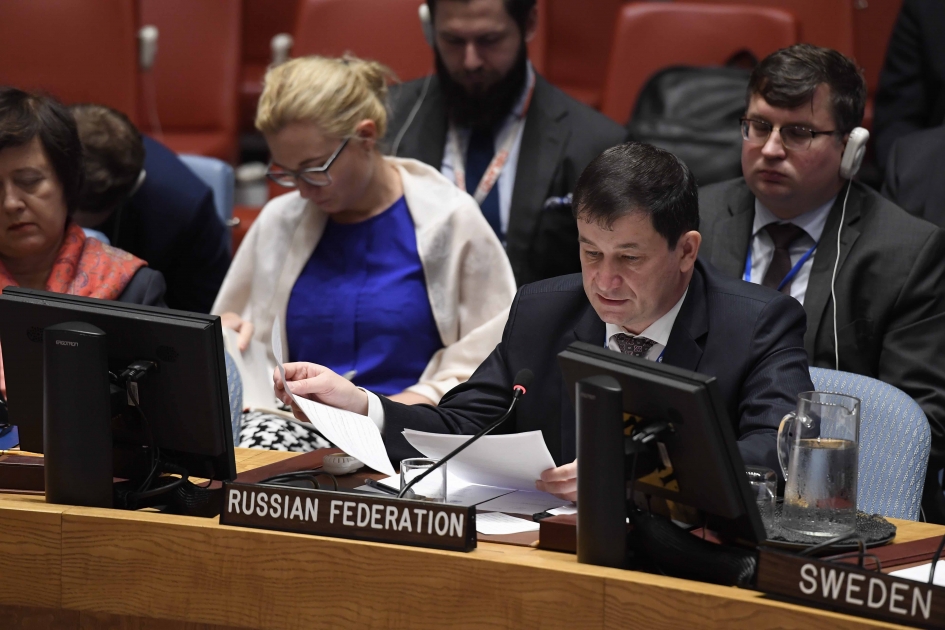Statement by Mr.Dmitry Polyansky, First Deputy Permanent Representative of the Russian Federation to the United Nations, at the Security Council on the sitiation in DR Congo
We thank Ms. Leila Zerrougui, the Special Representative of the Secretary-General, and Mr. Said Djinnit, the Special Envoy of the Secretary-General, for their comprehensive briefings on the situation in the Democratic Republic of the Congo and on the process of implementing the Peace, Security and Cooperation Framework for the Democratic Republic of the Congo and the Region.
We also very grateful to all of the staff S/PV.8370 The situation concerning the Democratic Republic of the Congo 11/10/2018 22/28 18-31620 of the Secretariat and the United Nations Organization Stabilization Mission in the Democratic Republic of the Congo (MONUSCO), as well as the other United Nations agencies that helped us to carry out a very successful and important visit to the Democratic Republic of the Congo.
During our time in the Democratic Republic of the Congo, all the members of the Council expressed the hope that the timely holding of elections on 23 December will help to reduce the country’s political tensions and stabilize the situation there. As we all had the opportunity to see for ourselves, the technical and legislative preparations for the December elections are proceeding in accordance with the electoral calendar established by the Independent National Electoral Commission.
It is important to note that the electoral rolls were audited under the auspices of the International Organization of la Francophonie and a final version from which repetitions and inaccuracies had been removed was published in September. We welcome the fact that half of the country’s political parties have already signed on to the electoral code of conduct. The election has also been advanced by the publication of the final list of registered candidates. We urge the opposition forces to abandon their negative agendas, take an active part in the election campaign and not expect the Security Council to evaluate the decisions of the Congolese courts.
At this important stage it would be unacceptable and irresponsible, in terms of the future of the Democratic Republic of the Congo, to try to sway the situation. That also particularly applies to the issue of bringing in electronic machines for printing ballots, which is well under way, as we were able to see for ourselves. At the same time, however, we call on the leadership of the Democratic Republic of the Congo to make additional efforts to build confidence among the main political forces in the country. As we understand it, the logistical preparations for the elections are already being carried out by the Independent National Electoral Commission.
We agree that in order to avoid disruptions during the electoral process, it will be essential to ensure its sustainable financing. We respect the decision of the Congolese Government to rely largely on its own resources in that regard, while at the same time we want to draw attention to the logistical capacities of MONUSCO, which is ready to contribute to the efforts of the authorities at any time. However, MONUSCO’s role in organizing and holding the elections should not go beyond the mandate outlined in resolution 2409 (2018). The protection of civilians in the context of the elections must be carried out with full respect for the basic principles of peacekeeping and without interfering in Kinshasa’s internal affairs.
The elections in the Democratic Republic of the Congo are not a panacea in themselves. We must focus on the social and economic agenda and on resolving the underlying reasons for the crisis, while not forgetting how important it is to continue countering the illegal armed groups in the eastern areas of the country, which are still a threat to the civilian population and one that is capable of destabilizing the Great Lakes region. We are certain that this last issue should be considered the chief indicator of the country’s stability and that decisions on the prospects and time frame for MONUSCO’s withdrawal should depend on how it develops, since the Mission’s main function is rectifying the security situation. It is impossible to stabilize the situation in the eastern Democratic Republic of the Congo by military means alone.
The implementation of the Peace, Security and Cooperation Framework for the Democratic Republic of the Congo and the Region will have to continue in the eastern and Great Lakes regions, as will the provision of assistance to State authorities and the restoration of social institutions in the parts of the country that have been liberated from the rebels. We should not fail to note the significant progress that has been made in implementing the Framework’s provisions. We welcome the launch of the mechanism for repatriating former combatants, which is unquestionably bringing positive momentum to relations between the Democratic Republic of the Congo, Rwanda and Uganda.
We sincerely hope that they will eventually be able to resolve that longstanding problem. It is encouraging that the problem of relocating the members of the South Sudan opposition who arrived in the Democratic Republic of the Congo in August 2016 is close to being resolved. We also want to note Mr. Djinnit’s role in supporting the effort to attract private investors in order to boost economic cooperation among the countries of the region and strengthen peace and confidence there.
We agree with the view of the regional Powers that resolving the problems of illegal armed groups in the Great Lakes region could be helped by improving the effectiveness of MONUSCO’s Intervention Brigade. In that regard, we believe it makes sense to focus their main activity on the most problematic areas of the country. In conclusion, I would like to urge that we not relax our attention to ensuring peacekeepers’ security and safety.
